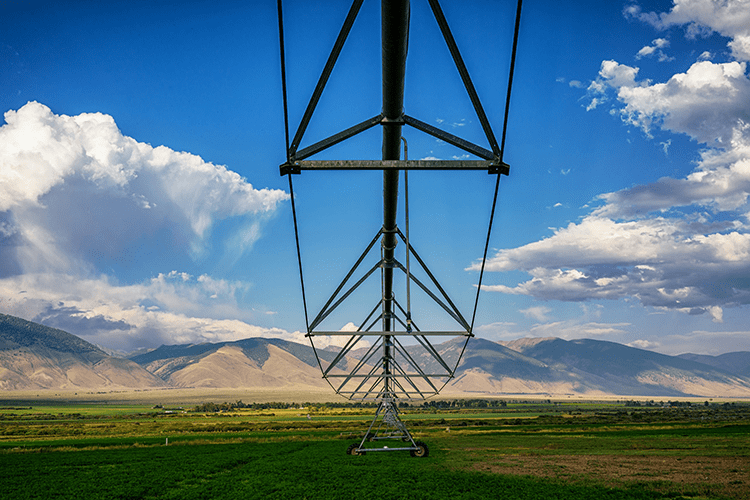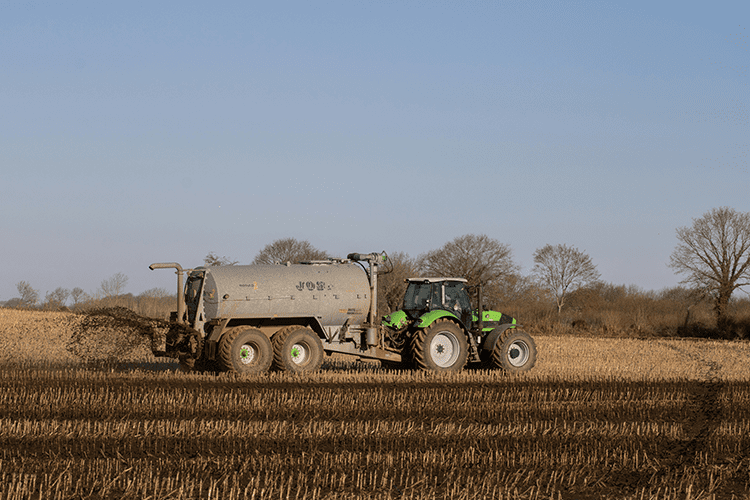APRIL 2024 TOOLKIT
ENHANCING WATER EFFICIENCY AND MANAGEMENT
Our nation depends on a safe, ample, and reliable water supply for its agricultural productivity, economic prosperity, environmental safety, and public health.
Water management issues are especially relevant to colleges of agriculture and natural resources at land-grant universities (LGUs) in part because the agricultural sector accounts approximately 80 percent of water consumption in the United States. LGUs play a crucial role in increasing water efficiency and improving management practices through agricultural research, education, and Extension. LGUs help farmers and ranchers implement tools and strategies that increase water efficiency, conserve resources, and maximize production.
RESEARCH
LGU scientists are discovering and advancing solutions to multiple water challenges. Important research areas include irrigation management (e.g., precision irrigation automated systems, soil moisture monitoring) to optimize water use under different conditions. For example, precision irrigation systems and technologies (e.g., sensor-based irrigation systems and data-driven decision-making tools) use real-time data (e.g., soil moisture levels and weather conditions) to optimize consumption. By precisely delivering the right amount of water to crops, farmers integrate efficient irrigation practices that conserve water and reduce expenses.
EDUCATION
LGU educators share knowledge with their students that is critical to developing the next generation of hydrologists, climate scientists, engineers, chemists, and a range of other professions so that students are prepared to address the future’s pressing water challenges. In addition, land-grants encourage interdisciplinary work so experts in agriculture, hydrology, ecology, and other fields collaborate and address complex water efficiency challenges.
EXTENSION
Cooperative Extension professionals encourage producers to adopt best water management practices and help communities mitigate the impacts of floods and droughts. Extension educators help farmers and ranchers implement water-efficient practices and techniques and plan for extreme weather events. For example, they demonstrate techniques so farmers can see innovative water management in action. Extension offers technical assistance to assess producers’ water practices, offer customized advice, and provide on-the-ground support.
Adapted from: APLU’s America’s Public & Land-grant Universities: Leveraging Discovery, Education, and Engagement for Climate-Smart Solutions.
POWERFUL EXAMPLES FROM LANDGRANTIMPACTS.ORG
Water is one of the most important challenges facing agriculture and communities throughout the U.S. Land-grant universities are discovering new ways to increase water efficiency, reduce water use, and protect water quality. For example:
- Alabama A&M University is keeping over 1500 pounds of medication out of the water system.
- Central State University is improving water quality in Ohio watersheds.
- Kansas State University is helping homeowners adapt their gardening practices and conserve water.
- Michigan State University is providing online course to increase lake literacy and protect waterways.
- Oregon State University is helping alfalfa growers in water-depleted areas increased yield.
- Pennsylvania State University is improving Chesapeake Bay water quality.
- University of Connecticut created a water quality mapping tool to protect the Long Island Sound.
- University of Minnesota is helping members of the White Earth Nation and others conduct well water screening clinics.
- University of Nevada is reducing pesticide contamination in urban waterways.
- University of New Hampshire is monitoring water bodies for earlier detection of threats.
Source: Protecting our water – Land-Grant Impacts (landgrantimpacts.org)
SOCIAL MEDIA
SAMPLE POSTS
RESEARCH
Did you know that the agricultural sector accounts for 80% of water consumption in the U.S.? #LandGrantUniversities are at the forefront of water management research, helping America’s farmers integrate efficient irrigation practices to conserve water and reduce expenses. [LINK TO PROJECT]
EDUCATION
Students in our [PROGRAM] major are equipped with the skills they need to become the next generation of [hydrologists/climate scientists/engineers/policymakers/educators] and address the future’s pressing water challenges.
EXTENSION
.@SCHOOL Cooperative Extension professionals help [state] manage complex water issues. Our educators provide hands-on support to mitigate the impacts of [floods/droughts/extreme weather events] and partner with [users/managers/policymakers] to advance water conservation and best management practices.
Looking for pre-made stories to feature? Check out:
- Land-grant Impacts
Scroll down to "View by Institution" and click your university's name. Only institutions who submitted impacts to the National Impacts Database in 2023 are listed. This page features research and Extension impacts. - Multistate Research Funds Impacts
Scroll down to "Filter by Institution" on the sidebar and click your university's name. This page features research impacts.
Feel free to reach out to us with specific posts that you would like @AgIsAmerica to share. Please email your request to Kim Scotto at agcomms@aplu.org or use #AgIsAmerica.
HASHTAGS AND HANDLES
HASHTAGS
#LandGrantUniversities
#AgIsAmerica
HANDLES
|
Ag is America |
@AgIsAmerica |
|
APLU Ag |
@APLU_Ag |
|
Sec. Vilsack (Secretary of Agriculture) |
@SecVilsack |
|
USDA |
@USDA |
|
USDA National Institute of Food & Ag |
@USDA_NIFA |
|
APLU |
@APLU_News |
|
Cooperative Extension |
@Ext100Years |
CALENDAR
APRIL HOLIDAYS
MONTHS
National Garden Month, #NationalGardenMonth
National Pecan Month, #NationalPecanMonth
National Soy Foods Month, #NationalSoyFoodsMonth
National Volunteer Month, #NationalVolunteerMonth
WEEKS
April 1-7: National Public Health Week, #NPHW
April 1-7: National Wildlife Week, #NationalWildlifeWeek NWF Toolkit
April 21-27: National Volunteer Week, #NVW
DAYS
April 3: National Walking Day, #NationalWalkingDay
April 7: National Beer Day, #NationalBeerDay
April 14: National Gardening Day, #NationalGardeningDay
April 14: National Pecan Day, #NationalPecanDay
April 16: National Orchid Day, #NationalOrchidDay
April 17: National Banana Day, #NationalBananaDay
April 17: National Crawfish Day, #NationalCrawfishDay
April 19: National Garlic Day, #NationalGarlicDay
April 20: Volunteer Recognition Day, #VolunteerDay
April 21: National Rendering Day, #NationalRenderingDay
April 22: Earth Day, #EarthDay, #InvestInOurPlanet
April 24: Stop Food Waste Day, #StopFoodWasteDay
April 26: National Arbor Day, #ArborDay
April 27: World Veterinary Day, #WorldVeterinaryDay
Source: April - National Day Calendar



